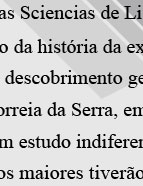

................................
However, this current, the drivers of which may be found among us, especially authors such as Vasco Pulido Valente (1941-2020), refused to be identified as neo-positivist. Rather than merely collecting events and seeking answers to the historian's questionnaire, which must necessarily be formulated in the present, it proposed presenting the facts as they are recorded in documents, in a sequential and meaningful manner, addressing the morals, ethics, and values of the time. The new narrative would focus on the succession of events, rather than merely isolated incidents. The narrative signalled a return of the arbitrary and subjective, tempered by heuristics and hermeneutics, that is, by a method and an indispensable set of rules. After all, History, as a discipline, in its origin and for centuries, although closely related in its demand for proof, and especially from the late eighteenth century onwards, became autonomous and clearly diverged from literature, oratory, and theology, with this divergence accentuating from the late nineteenth century as a social science.
A more up-to-date assessment would be subject to a variety of evaluations. On the one hand, in recent years, there has been an extreme thematic and epistemological fragmentation of the field of history in the post-modern, or “post-historical,” period, where no unity is detected in the topics chosen for investigation, leading to a History on everything and everyone with no concern for understanding what contributes—or does not contribute—to the advancement of knowledge about past societies. On the other hand, while it is the historian’s task to describe the multiple forms of reality fragmentation, there is simultaneously a genuine democratisation of the subjects selected for research and publication.
The emergence of new topics compels political history to transform itself and seek to extend its analytical perspective to fields that until recently have been almost impenetrable. Examples of these fields include local and regional history, history of the press, gender, education, art, the church, or institutions. Political history will have its future reserved as a means of thinking about human action in space and time.
